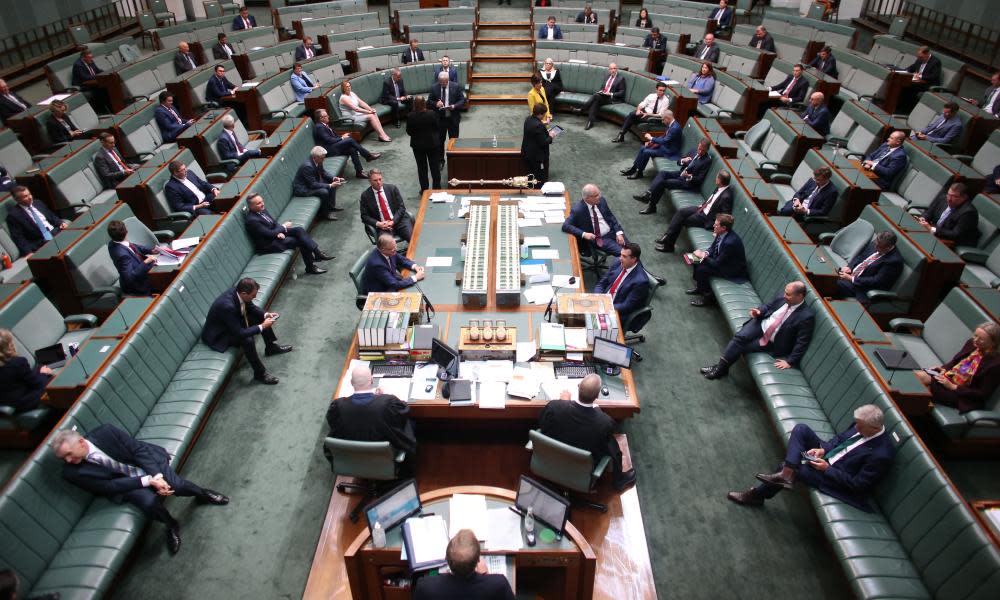Australian politicians don’t need a binding code of conduct, Liberal and Labor MPs say

A committee stacked with Liberal and Labor MPs has said there is no compelling need for federal politicians to face a binding code of conduct and has recommended against establishing an independent parliamentary standards commissioner.
The finance and public administration legislation committee on Wednesday released a report on a Greens reform proposal, which sought to establish a statutory, independently enforced code of conduct to govern the behaviour of parliamentarians.
It also proposed establishing a parliamentary standards commissioner, who would enforce the code, and an integrity advisor, who would advise MPs on ethical issues.
The proposal was designed to cover lower-level integrity, behavioural and ethical issues that might not rise to the level of corruption. The Greens said it aimed to encourage respectful behaviour in parliament, deal with conflicts of interest, and ensure that public money was used in the public interest.
Parliamentary codes of conduct exist in the United Kingdom and Canada. The UK also has independent parliamentary standards commissioners for both houses, while Canada appointed an independent ethics commissioner in 2004.
Australia, despite numerous inquiries, has not established a parliamentary code of conduct. Federal ministers are governed by the ministerial standards, but they are neither independently enforced nor binding.
Related: Christian Porter questions whether privilege would apply to MPs on parliament video conferencing
The committee – made up of three Liberals, two Labor MPs and One Nation’s Malcolm Roberts – recommended on Wednesday that the Greens’ bill should not be passed.
“The committee notes that previous Senate committees have not recommended the adoption of a parliamentary code of conduct,” it said. “Based on the evidence before it, this committee is not persuaded that the circumstances have now changed such that there is a strong argument for introducing a code of conduct.”
It also argued that the proposal for an integrity commissioner and adviser risked overlapping with existing bodies, such as the Independent Parliamentary Expenses Authority.
“The committee believes the better approach would be to identify gaps (if any) in the existing regimes and implement measures to address these gaps.”
In additional comments, Labor slammed the Coalition for not moving on its long-dormant proposal for a federal anti-corruption commission.
The Greens senator Larissa Waters said the committee’s recommendation meant “the major parties have failed the test” on integrity.
“With scandal after scandal and regular poor behaviour, the public generally thinks politicians are all corrupt, in it for themselves, and behave like pork chops in parliament,” she said.
“With parliamentary sittings due to resume shortly, sadly we clearly need stronger, independently enforced standards that apply to all parliamentarians and their senior staff to act with integrity, avoid conflicts of interest, and use resources in the public interest.”
Helen Haines, the independent MP for Indi, labelled the recommendation “tremendously disappointing” on Twitter.
“The parliamentary standards bill would have created a statutory code of conduct for MPs and their staff and a dedicated parliamentary standards commissioner to oversee it,” she tweeted.
“There’s too many #auspol scandals I could choose from to illustrate why we need this.”
Movement on the proposed federal anti-corruption commission has largely stalled. Earlier this year, the attorney general, Christian Porter, indicated that draft legislation had been ready for release but was delayed due to Covid-19.
The government has already missed several self-imposed deadlines to introduce its legislation. The model it has proposed has been widely criticised as weak and flawed.
The Greens have their own bill for an integrity commission, which passed the Senate. Haines has also proposed introducing a new integrity commission bill when parliament resumes.
“Over recent months, I have been meeting with MPs across the political spectrum to hear their concerns about an integrity commission,” she said. “My bill responds to these concerns whilst offering a robust way forwards that I hope will win the support of all my parliamentary colleagues.”


